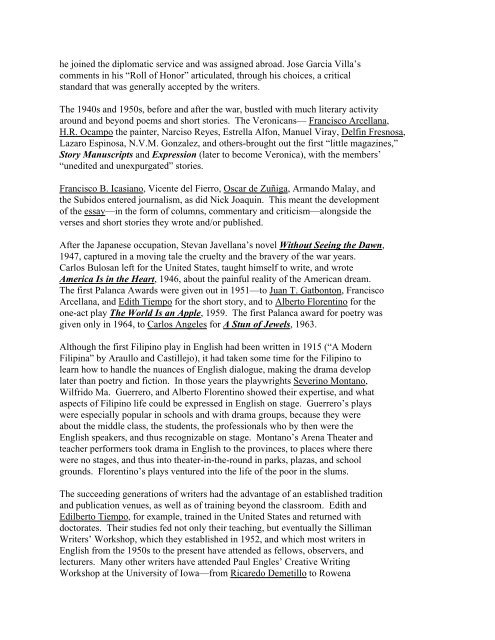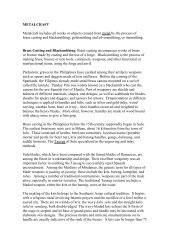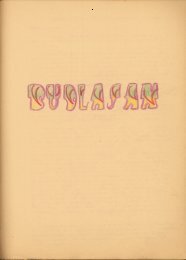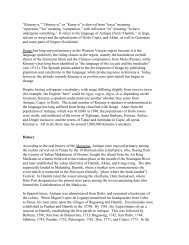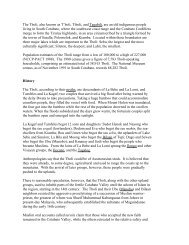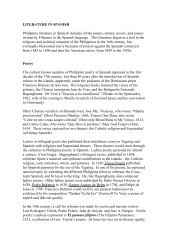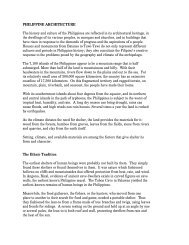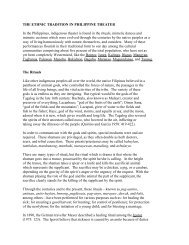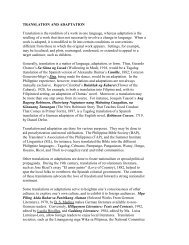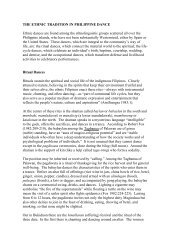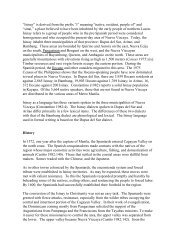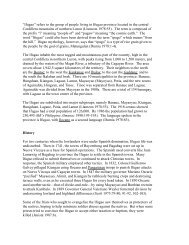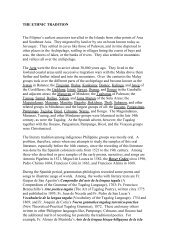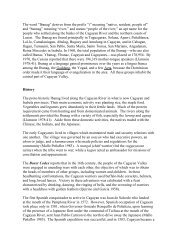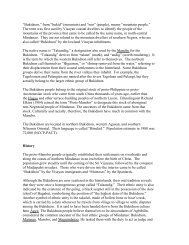LITERATURE IN ENGLISH Philippine literature in English is ...
LITERATURE IN ENGLISH Philippine literature in English is ...
LITERATURE IN ENGLISH Philippine literature in English is ...
Create successful ePaper yourself
Turn your PDF publications into a flip-book with our unique Google optimized e-Paper software.
he jo<strong>in</strong>ed the diplomatic service and was assigned abroad. Jose Garcia Villa’s<br />
comments <strong>in</strong> h<strong>is</strong> “Roll of Honor” articulated, through h<strong>is</strong> choices, a critical<br />
standard that was generally accepted by the writers.<br />
The 1940s and 1950s, before and after the war, bustled with much literary activity<br />
around and beyond poems and short stories. The Veronicans— Franc<strong>is</strong>co Arcellana,<br />
H.R. Ocampo the pa<strong>in</strong>ter, Narc<strong>is</strong>o Reyes, Estrella Alfon, Manuel Viray, Delf<strong>in</strong> Fresnosa,<br />
Lazaro Esp<strong>in</strong>osa, N.V.M. Gonzalez, and others-brought out the first “little magaz<strong>in</strong>es,”<br />
Story Manuscripts and Expression (later to become Veronica), with the members’<br />
“unedited and unexpurgated” stories.<br />
Franc<strong>is</strong>co B. Icasiano, Vicente del Fierro, Oscar de Zuñiga, Armando Malay, and<br />
the Subidos entered journal<strong>is</strong>m, as did Nick Joaqu<strong>in</strong>. Th<strong>is</strong> meant the development<br />
of the essay—<strong>in</strong> the form of columns, commentary and critic<strong>is</strong>m—alongside the<br />
verses and short stories they wrote and/or publ<strong>is</strong>hed.<br />
After the Japanese occupation, Stevan Javellana’s novel Without See<strong>in</strong>g the Dawn,<br />
1947, captured <strong>in</strong> a mov<strong>in</strong>g tale the cruelty and the bravery of the war years.<br />
Carlos Bulosan left for the United States, taught himself to write, and wrote<br />
America Is <strong>in</strong> the Heart, 1946, about the pa<strong>in</strong>ful reality of the American dream.<br />
The first Palanca Awards were given out <strong>in</strong> 1951—to Juan T. Gatbonton, Franc<strong>is</strong>co<br />
Arcellana, and Edith Tiempo for the short story, and to Alberto Florent<strong>in</strong>o for the<br />
one-act play The World Is an Apple, 1959. The first Palanca award for poetry was<br />
given only <strong>in</strong> 1964, to Carlos Angeles for A Stun of Jewels, 1963.<br />
Although the first Filip<strong>in</strong>o play <strong>in</strong> <strong>Engl<strong>is</strong>h</strong> had been written <strong>in</strong> 1915 (“A Modern<br />
Filip<strong>in</strong>a” by Araullo and Castillejo), it had taken some time for the Filip<strong>in</strong>o to<br />
learn how to handle the nuances of <strong>Engl<strong>is</strong>h</strong> dialogue, mak<strong>in</strong>g the drama develop<br />
later than poetry and fiction. In those years the playwrights Sever<strong>in</strong>o Montano,<br />
Wilfrido Ma. Guerrero, and Alberto Florent<strong>in</strong>o showed their expert<strong>is</strong>e, and what<br />
aspects of Filip<strong>in</strong>o life could be expressed <strong>in</strong> <strong>Engl<strong>is</strong>h</strong> on stage. Guerrero’s plays<br />
were especially popular <strong>in</strong> schools and with drama groups, because they were<br />
about the middle class, the students, the professionals who by then were the<br />
<strong>Engl<strong>is</strong>h</strong> speakers, and thus recognizable on stage. Montano’s Arena Theater and<br />
teacher performers took drama <strong>in</strong> <strong>Engl<strong>is</strong>h</strong> to the prov<strong>in</strong>ces, to places where there<br />
were no stages, and thus <strong>in</strong>to theater-<strong>in</strong>-the-round <strong>in</strong> parks, plazas, and school<br />
grounds. Florent<strong>in</strong>o’s plays ventured <strong>in</strong>to the life of the poor <strong>in</strong> the slums.<br />
The succeed<strong>in</strong>g generations of writers had the advantage of an establ<strong>is</strong>hed tradition<br />
and publication venues, as well as of tra<strong>in</strong><strong>in</strong>g beyond the classroom. Edith and<br />
Edilberto Tiempo, for example, tra<strong>in</strong>ed <strong>in</strong> the United States and returned with<br />
doctorates. Their studies fed not only their teach<strong>in</strong>g, but eventually the Silliman<br />
Writers’ Workshop, which they establ<strong>is</strong>hed <strong>in</strong> 1952, and which most writers <strong>in</strong><br />
<strong>Engl<strong>is</strong>h</strong> from the 1950s to the present have attended as fellows, observers, and<br />
lecturers. Many other writers have attended Paul Engles’ Creative Writ<strong>in</strong>g<br />
Workshop at the University of Iowa—from Ricaredo Demetillo to Rowena


